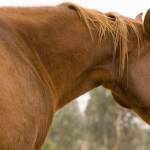Feeding Horses to Reduce Free Fecal Water

While most horse owners can easily identify diarrhea, recognizing a horse affected with “free fecal water,” or FFW, could prove more challenging.
According to a recent study*, FFW is defined as the excretion of fluid from the rectum that is separate from normal feces. The elimination of FFW can occur either concurrently or independently of normal feces.
Identified as a common problem in horses by the researchers, production of FFW causes dirty, hard-to-clean hind legs, potentially leading to dermatitis or inflammation of the skin requiring veterinary intervention.
While the exact causes of FFW remain unclear, several have been suggested. Examples include:
- Social stress, such as that experienced by horses at the low end of the social hierarchy or pecking order;
- Physical stress, like that incurred during transport;
- Feed-related issues, such as offering products tainted with mycotoxins;
- Factors negatively affecting the microbial balance of the intestinal tract; and
- Inflammation of the gastrointestinal lining.
Unfortunately, no clear standardized recommendations exist at this time, but supportive treatment options can be discussed with your veterinarian.
“In a case report published on a single horse with FFW, nutritional measures were taken to solve the problem. In addition to switching to a balanced diet, carbohydrates were restricted and only good-quality first-cut meadow hay and pelleted meadow hay was fed as forage,” explained Kathleen Crandell, Ph.D., a nutritionist for Kentucky Equine Research.
She added, “Maximizing the health of the large intestine through proper nutrition might be key to thwarting FFW. When necessary, such as during times of stress or dietary changes, a hindgut buffer such as EquiShure could be beneficial.” EquiShure helps control the pH of the cecum and colon through stabilization of the microbial population.
“For additional information on balancing your horse’s diet to prevent or eliminate FFW and nutrition-related diarrhea, consult a Kentucky Equine Research nutrition advisor,” advised Crandell. Contact a veterinarian whenever a horse displays diarrhea.
*Gerstner, K., and A. Liesegang. 2018. Effect of a montmorillonite-bentonite-based product on faecal parameters of horses. Journal of Animal Physiology and Animal Nutrition (Berl) 102 (Suppl 1):43-46.








